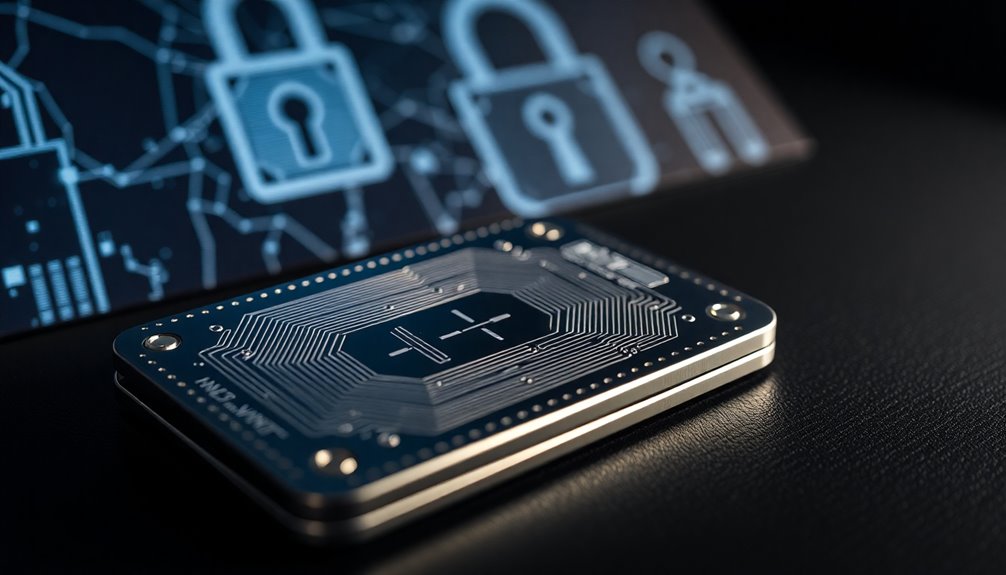A crypto ledger is a digital record that securely tracks every transaction in a cryptocurrency network. It guarantees transparency and prevents unauthorized changes, making the data immutable. Whenever you make a transaction, it's signed with your private key and broadcasted to the network for validation. Once validated, transactions are grouped into blocks and added to the blockchain. This process assures that every transaction is permanently recorded, giving you peace of mind. Understanding how this ledger works is essential for anyone involved in crypto. If you explore further, you'll uncover even more insights about its significance and operation.
Key Takeaways
- A crypto ledger is a digital record of all transactions made within a cryptocurrency network, ensuring transparency and security.
- It operates on a decentralized blockchain, where each participant maintains a copy of the ledger for verification.
- Ledgers utilize cryptographic algorithms to secure transaction data, preventing unauthorized access and tampering.
- Each block in the ledger contains a set of verified transactions, which are permanently added to the chain.
- Crypto ledgers enable trustless transactions, eliminating the need for intermediaries by providing a verifiable history of all activities.
Crypto Wallet Fundamentals Explained

A crypto wallet is your gateway to the world of digital currencies, allowing you to store, send, and receive cryptocurrencies securely.
With a solid understanding of crypto wallet fundamentals, you can efficiently manage your digital assets. You'll encounter two main types: hardware wallets and non-custodial wallets.
Hardware wallets offer a secure way to store private keys offline, protecting your crypto from online threats. Non-custodial wallets give you full control over your cryptocurrency, ensuring you manage your transactions without relying on third parties.
Each transaction you make gets recorded on the blockchain ledger, creating a transparent history.
Crypto Wallet Essentials Overview

Understanding crypto wallet essentials is essential for effectively managing your digital assets.
Crypto wallets, like Ledger hardware wallets, provide a secure way to store your private keys. These wallets use a secure element chip to enhance security, especially when you're using a secure touchscreen hardware wallet.
By employing cold storage, your assets remain offline, greatly reducing the risk of online threats. Always remember to write down your recovery phrase; it's important for restoring access to your assets.
When sending and receiving cryptocurrencies, confirm you're aware of the supported coins in your wallet.
Transaction Process and Verification

When you initiate a cryptocurrency transaction, it's vital to understand how the process works to guarantee your assets are securely transferred.
First, you create a transaction that's digitally signed with your private keys, ensuring authenticity. The transaction is then broadcast to the network, where nodes validate the transaction against blockchain rules, confirming you have sufficient funds.
After validation, transactions group into blocks, added to the blockchain through mining or consensus. Each block contains a cryptographic hash of the previous block, forming a secure chain that resists tampering.
Confirmations occur within minutes to hours, depending on network conditions, increasing the certainty that your transaction is permanent and irreversible.
Understanding this process is important for safeguarding your crypto assets.
Pros and Cons Summary

While using a crypto ledger offers numerous advantages, it's vital to weigh both the pros and cons to make an informed decision.
Ledger hardware wallets provide enhanced security by storing private keys offline, minimizing the risk of online threats that often target hot wallets. You maintain full control over your crypto assets, promoting self-custody, which is essential for asset security. Additionally, these devices support over 5,500 diverse digital assets.
However, relying on third-party software for transactions can introduce vulnerabilities, and you may need technical knowledge for setup and maintenance.
Finally, if you lose your hardware wallet without securing your recovery phrase, you risk losing access to your crypto assets permanently.
Custodial vs. Non-Custodial Differences

Deciding between custodial and non-custodial wallets is a key step in managing your crypto assets.
Custodial wallets, managed by third parties, provide convenience but strip you of control over your private keys and security. If something goes wrong, you might face risks like hacks or outages.
In contrast, non-custodial wallets grant you full user ownership, enabling better privacy and control. However, they require you to handle key management and recovery phrases, which can lead to irreversible loss if mishandled.
While custodial wallets often support beginners with customer service for recovery, experienced users may favor non-custodial options for enhanced sovereignty and security.
Ultimately, it's about weighing convenience against the control and security you desire.
Security Vulnerabilities in Wallets

Security vulnerabilities in wallets can pose significant risks, especially if you're unaware of the potential threats lurking in the digital space.
Hot wallets, being online, are particularly vulnerable to malware and phishing attacks. If you use a mobile wallet, keep in mind that device theft or SIM swap attacks can compromise your private keys.
While hardware wallets are generally safer, they aren't foolproof; physical access can lead to theft, and poor initial setups may introduce software vulnerabilities.
Always conduct regular security audits and updates to patch any weaknesses. Most importantly, never share your private keys or recovery phrases, as this can result in unauthorized access and irreversible loss of funds.
Stay vigilant to protect your assets.
Decentralized Finance Wallet Integration

As you explore the world of decentralized finance (DeFi), integrating a Ledger wallet can greatly enhance your experience.
Ledger wallets seamlessly connect with compatible DeFi wallets like MetaMask and Phantom, allowing you to manage and stake your digital assets securely.
With Ledger Live, you can access staking options for various cryptocurrencies, earning rewards while keeping your assets in cold storage.
This integration provides you with greater control over your investments and greatly reduces exposure to online threats.
You can safely buy and sell cryptocurrencies within a decentralized environment, enjoying peace of mind knowing your assets are protected.
Use Strong Passwords Consistently

A strong password is your first line of defense in protecting your crypto assets. To enhance security, create strong passwords that are at least 12 characters long, mixing uppercase, lowercase, numbers, and special symbols.
Consistently update these passwords, especially after a data breach, to mitigate risks and safeguard access to your accounts. Using a unique password for each crypto-related account prevents a single point of failure, ensuring that a compromised password doesn't endanger all your assets.
Additionally, enable two-factor authentication (2FA) alongside strong passwords to make it tougher for unauthorized users to gain access.
Consider using a password manager to maintain strong, complex passwords effortlessly and promote consistent security across all your crypto accounts.
Frequently Asked Questions
What Does a Crypto Ledger Do?
A crypto ledger securely stores your private keys offline, keeping your digital assets safe from online threats.
It lets you manage various cryptocurrencies while maintaining full control over your keys, so you don’t have to rely on third parties. This level of independence not only enhances your security but also enables you to actively participate in decentralized finance and other blockchain-based activities. By taking charge of your assets, you can make informed decisions without the worry of external risks. In this context, understanding tokens in language models becomes increasingly relevant as it allows users to grasp the underlying mechanisms that drive these digital currencies and their interactions within different platforms.
When you set it up, it generates a unique recovery phrase, letting you restore access if the device is lost.
Regular updates guarantee your ledger stays secure against potential vulnerabilities.
Do I Own My Crypto on Ledger?
"Possession is nine-tenths of the law." When you use a Ledger wallet, you truly own your crypto.
You control your private keys, meaning you're the sole guardian of your assets, unlike with custodial wallets. Your private keys are stored offline, boosting security.
Plus, with a 24-word Secret Recovery Phrase, you can recover your funds if something happens to your device.
Can I Lose My Crypto on Ledger?
Yes, you can lose your crypto on a Ledger wallet if you're not careful.
If you lose your hardware device and haven't backed up your Secret Recovery Phrase, you'll lose access to your assets.
Additionally, if you fall for phishing scams or share your recovery phrase, your funds could be compromised.
Always keep your recovery phrase secure, regularly update your device, and practice good security habits to protect your investments.
How Do You Cash Out Ledger Crypto?
To cash out your crypto from a Ledger wallet, start by connecting your device to Ledger Live or another compatible software wallet.
Transfer your crypto to an exchange like Coinbase or Binance, where you can sell it for fiat currency.
Once you've sold your assets, follow the exchange's process to withdraw the fiat to your bank account.
Don't forget to check for any fees, limits, and potential tax implications before you proceed!
Conclusion
In summary, understanding crypto wallets is vital for traversing the digital currency landscape. Did you know that as of 2023, over 300 million cryptocurrency users worldwide rely on digital wallets? This growing trend highlights the importance of being informed about wallet types, security measures, and the transaction process. By staying educated and employing strong passwords, you can protect your assets while enjoying the benefits of decentralized finance. Embrace this exciting financial frontier with confidence!









